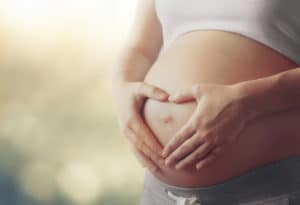When it pinches and twinges in the tummy, it is unpleasant for the baby and it reacts with whining and crying. In young babies, in particular, air swallowed in the ab domain while drinking or crying is the cause of abdominal pain.
But digestion also has to get going properly after birth. Some babies often have painful flatulence in the first few weeks or are simply sensitive to the digestive process. As the baby gets older, these problems usually disappear and the bloating and abdominal pain go away.
Your baby has a tummy ache and you don’t know what to do? Here you can find out.
Table of contents
Your Baby Has A Tummy Ache: The Pediatrician As A Contact Point
If your baby is only a few days or weeks old, abdominal pain due to flatulence is normal and no cause for concern. Nevertheless, you should ask your pediatrician, for example, as part of the check-up visits that are now made at short intervals anyway.
Many a baby has abdominal pain because he or she was born with lactose intolerance or has a malformation of the stomach outlet. Both cause abdominal cramps and can also be accompanied by frequent, gushing vomiting. These causes must be ruled out in order to be able to help your child in the best possible way.
Persistent crying or screaming, a pale facial color and a contracted or (very) distended abdomen are typical signals of often severe abdominal pain. Your child will pull his or her legs close to the body and move as little as possible.
The tummy often feels hard or your child reacts to its touch with clear pain signals. Check if your baby has a fever and try to calm him down by being physically close to him.
If it likes, you can give fennel tea even to young infants. This soothes the tummy and works against painful flatulence. If the baby’s tummy ache does not improve after one hour at the latest, or if it occurs repeatedly, please consult your pediatrician.
In these cases, you should also go to the pediatrician with your child:
- Acute, severe abdominal pain with sick-looking, shrill crying baby.
- If the baby cannot be calmed down or seems apathetic.
- If the abdomen feels tense and hard.
- If symptoms include vomiting and diarrhea, blood in stool (or no stool), fever and chills.
- If the baby’s tummy aches at night.
- If your baby has lost weight in the last few days.
- If the tummy ache comes on for no apparent reason or keeps coming back.
These Things Cause Your Baby To Have A Tummy Ache
Especially in the first three months of life, many babies suffer from tummy aches, regardless of whether they are breastfed or bottle-fed. There are many possible causes, although simple flatulence or the notorious three-month colic are common.
Typical symptoms of abdominal pain are mainly:
- Seizure-like, often shrill crying.
- The child can hardly be calmed down even by being carried and cradled.
- Tucked up legs and bent posture.
- Bloated, pressure-sensitive abdomen.
- Red face, sweaty skin.
All symptoms may or may not occur at the same time. Once the pediatrician has identified the cause of the baby tummy ache, you can help your child in several ways.
Newborns Often Suffer From Flatulence
If your baby suffers from tummy ache, flatulence is often the cause. The pediatrician also calls this meteorism. Bloating is caused by excessive air in the tummy, which often enters the intestines through swallowing while crying or drinking.
In addition, the digestive tract must first learn why gases produced during digestive processes do not escape quickly enough and therefore accumulate in the intestines. As a result, your baby suffers from abdominal pain, which often occurs shortly after a meal or in the evening.
Since your little one is not yet able to express himself in any other way, he helps himself by crying shrilly and thus draws attention to his discomfort.
The Most Common Causes Of Flatulence
Flatulence is not uncommon in young babies up to the age of about three months and occurs very frequently. After that, the painful abdominal cramps subside significantly. The cause is probably that the intestinal flora is not yet fully developed and the digestive system is not yet functioning properly.
The flatulence is mainly favoured by these conditions:
- Baby swallows too much air when drinking.
- Stress, overstimulation and restlessness.
- Switching from milk to solid food.
As you can see, baby tummy ache can also have psychological causes: For example, if your baby cries a lot because it feels stressed and overwhelmed in everyday life, it will also swallow air, which in turn causes abdominal cramps and makes your child cry even more. In addition, a bloated belly can also have pathological causes or be caused by food intolerance or allergy.
Suspicious and in urgent need of clarification by the pediatrician are these accompanying symptoms:
- Long and extensive crying after every meal.
- Diarrhea.
- Constipation or hard stools.
- Refusal to eat.
- Absent or insufficient weight gain.
In these cases, the doctor will look for other organic causes of the painful bloating belly.
These Home Remedies Help Against Baby Tummy Ache
If your baby suffers from tummy ache due to flatulence, you can help him or her with these measures:
| Clothes | Dress your baby in loose-fitting clothing that does not constrict the tummy. Prefer rompers to jeans, for example. |
| Warmth | A warm cherry stone pillow (do not put it on the bare skin!) or a warm bath is good for flatulence. |
| Massage | Gently massage baby’s tummy clockwise around the belly button. You can also massage in tummy oil based on caraway, anise or fennel. |
| Fly hold | Lay your baby on his stomach on your bent forearm, with his head facing your elbow and you holding one thigh with your hand. |
| Bend legs | Support your baby by helping him deflate by bending his legs toward his belly. |
| Tea | Give your child unsweetened caraway or fennel tea to drink between meals. |
In addition, the following gentle medicines from the pharmacy have proven effective for infant abdominal pain:
- Caraway suppositories: Give your child a caraway suppository before each meal or as needed.
- Defoamers (e.g. Sab Simplex): Drop these into the bottle milk or give them to your child on a spoon before a breastfeeding meal.
- Chamomilla: Some parents swear by homeopathic remedies such as Chamomilla. Ask your midwife about it.
How To Prevent Baby Tummy Ache
Burping after every meal and in between helps your baby to let out air and prevents so much air from accumulating in the tummy in the first place. This means less tummy ache.
Make burping easier for your baby by:
- Holding him or her upright after drinking.
- Lightly patting him on the back.
- Walking around and gently rocking him or her.
Bottle-fed infants also benefit from a so-called anti-colic bottle, which prevents excessive air intake from the outset. Also, make sure that you let the bottle stand for a few minutes after shaking it, so that the air bubbles created by the shaking can dissipate.
Breastfeeding infants should completely enclose the nipple with their mouth and, above all, drink at the breast for longer than just a few minutes: the milk, which is very rich in lactose and often causes problems for the tummy, flows first. The high-fat milk, on the other hand, only flows later but helps against baby tummy ache.
Also, take your time when drinking and make sure that your child – whether breastfeeding or bottle-feeding – can drink calmly and without rushing. If you are breastfeeding, you should also avoid highly flatulent foods such as onions and cabbage and drink fennel, caraway or anise tea.
These herbs also have the advantage of stimulating milk production.
Colic Or Flatulence? How To Help Your Baby
About 16 out of 100 babies cry remarkably a lot and are difficult to calm down. In these children, what is thought to be a baby tummy ache due to flatulence may also be colic.
The so-called three-month colic typically occurs for the first time between the second and third week of life and often gradually stops after the third month of life. In the past, it was assumed that abdominal cramps were the cause of the crying episodes.
Today, however, pediatricians assume that it is a regulatory disorder. The affected children simply cannot calm themselves and are often very sensitive to changes in the daily routine or everyday stimuli.
Such a child, also known as a “cry baby”, needs a lot of rest. It should be exposed to few stimuli. A daily routine that is the same every day also contributes to its relaxation.
In addition, you should often carry your baby and give him a lot of physical closeness, as this gives your child a sense of security and safety. Nevertheless, a baby affected by regulation disorders can also have tummy aches: During excessive crying, these children swallow a lot of air and subsequently suffer from flatulence.











2 thoughts on “Your Baby Has A Tummy Ache? What To Do Now”